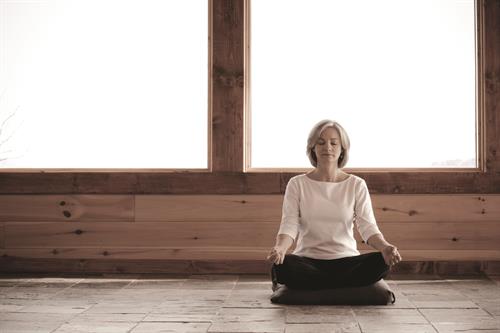No matter how hard we try, stress always finds its way into our lives. Lucky enough, there are plenty of effective coping mechanisms, including meditation. Here is why meditation is so much more than sitting in silence.
“Stress can cause or aggravate many illnesses and injuries, so controlling stress should be anyone’s first step toward a healthy lifestyle,” said Dr. Thomas Schumacher a board-certified family medicine physician with Swedish Covenant Medical Group. “I advise my patients to cope with stress in healthy, productive ways that work for them and I often recommend calming exercises like meditation.”
The best part about meditation is that it can be done anywhere and adjusted to fit into your schedule.
“Benefits have been documented in as little as five minute of meditation a day with greater benefits associated with longer daily sessions,” said Kayla Kulans, manager of integrative therapy services at Galter LifeCenter. “Regular meditation has been shown to reduce stress, control anxiety, promote emotional stability, lengthen attention span, improve sleep, reduce pain and decrease blood pressure.”

Here are five simple steps to incorporate meditation into your life:
- Pick a time and a place. Meditation should only be as time-consuming as your schedule allows. Remember: the goal is to reduce stress, not create it. Meditation can be incorporated during lunch breaks, after a workout, or during down time throughout the day. It is most effective when done in a comfortable, distraction-free setting, which can be your office, home and virtually anywhere in between. Try to find a plush cushion, chair or mat for the duration of your meditation.
- Position yourself. Find a comfortable placement for your body and relax your muscles. It is most common to sit up straight during meditation, although you can also lie down or stand up. Close your eyes and release any tension in your body.
- Breathe. Seems easy enough, right? This is the cornerstone of meditation. Don’t aim to control your breathing, let it occur at a natural rhythm. Do not overthink this step! Remember: this is a task our body performs constantly without a second thought or hesitation.
- Focus. Pay close attention to your breathing and the effects it has on your body. For example, notice how your stomach fills with air and your chest expands on each inhale. Take note of all that you are experiencing in that moment.
- Maintain. This is often the step that gives people trouble. Maintaining focus is what distinguishes sitting mindlessly from meaningful meditation. Our minds tend to wander naturally due to external and internal stimuli. The goal of meditation is to correct this by always gently directing your focus back to your breath. Instead of thinking about your ominous to-do list or what you are going to make for dinner, be PRESENT.
“The intention of meditation is not to stop thinking – that’s impossible!” said Kayla. “The intention is to learn to focus your thoughts, to become aware of them, and to learn not to be a slave to them.”
Science is giving all of us the perfect excuse to put on the brakes and RELAX. My advice? Take advantage of it!
---Thomas R. Schumacher, D.O., is a board-certified family medicine physician with Swedish Medical Group. His clinical interests include preventive medicine, women's health and osteopathic manipulation. Learn more>
To make an appointment with Dr. Schumacher, call 773-631-2223.
Have you tried meditation and are eager to take it to the next level? Or are you struggling to hold yourself accountable to meditate regularly? Galter LifeCenter offers two weekly meditation courses that do not require more than 45 minutes of your time! The classes are free for members and $25 for nonmembers.
Learn more about meditation courses at Galter LifeCenter>
Galter LifeCenter will be offering an 8-week meditation course this September that will teach four of the most evidence-backed types of meditation. Classes will include guided meditations as well as discussions on the intent and benefits of meditation practice. Participants will be provided with the resources and support to build a practice that fits their individual needs and lifestyles.
Join us for a free information session on our new Meditation program:
- Tuesday, August 7 at 8:30 a.m.
- Tuesday, August 14 at 12.30 p.m.
- Thursday, August 23 at 7 a.m.,
- Tuesday, August 28 at 3:30 p.m.
For more information about this course and our free information sessions contact Kayla Kulans at kkulans@swedishcovenant.org.